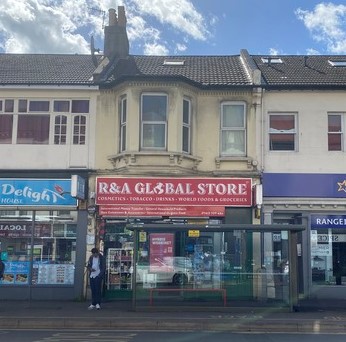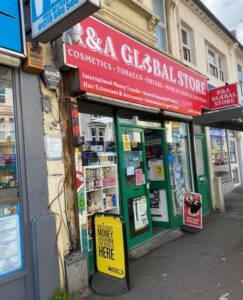A specialist grocer said that sales of alcohol would account for only a small part of his trade when he asked councillors to grant a drinks licence for a previously troubled premises.
Rigobel Fokou, 43, a director of R&A Global, at 17 Preston Road, Brighton, wants to sell alcohol from 9am to 11pm daily as part of a specialist offering for the African and Caribbean community.
Mr Fokou and his wife Keubeng Tatsa, 40, already have a drinks licence for a nearby premises – Afrika Mart at 4 Preston Road – but want to merge their shops on to the larger site.
But Preston Road is in a busy area where Brighton and Hove City Council has tougher rules on new licensed premises because of concerns about drink-related crime and anti-social behaviour.
And a previous trader at 17 Preston Road lost the licence in 2018 after a long history of licensing conditions being breached. The shop also failed test purchases by under-age customers.
At least three other licence applications for the premises have been refused or withdrawn because of its troubled history when it was known as International Food and Wine.
And in October 2020, when it was trading as A Nifty Store, illicit cigarettes were found on sale in the shop.
These historical issues and the council’s licensing policy formed the essence of objections from Sussex Police and the council’s licensing team at a council licensing panel hearing on Thursday (14 April).
The panel – made up three councillors – were concerned that if Mr Fokou was granted a licence for R&A Global, he could effectively turn the current Afrika Mart shop into an off-licence. Alternatively, he could sell the lease so that another trader could do open an off-licence there.
Mr Fokou has run Afrika Mart without incident for the past 11 years. He told the panel that he would consider giving up the licence for 4 Preston Road if he was granted a licence for 17 Preston Road.
He said: “The fact I’m being linked to the previous owner is really unfair to me. I am my own person. I manage my own business. It’s unfair to be dragging me into other people’s misdemeanours.”
One of the thre panel members, Councillor Anne Pissaridou, said: “We’re in no way demeaning your character. What we’re looking at is how a licensed off-licence in this area will exacerbate or not the current conditions.”
She asked about anti-social behaviour in the area and Mr Fokou said that he felt that things had improved in recent years.
Mr Fokou’s solicitor Winston Brown, of Brown and Co Solicitors, said that R&A Global was not the type of shop to attract passing trade. It was a food store focusing on Caribbean and African customers.
Mr Brown said: “If I’m walking down Preston Road and I want to buy alcohol – and let’s assume I’m someone who’s irresponsible and wants to get drunk – I’m not going to go into Mr Fokou’s premises.
“It’s not that type of off-licence. I fully accept the application would tick the box for alcohol off the premises. But this is not your typical off-licence where someone goes in to buy alcohol.”
Mr Brown said that alcohol was not “the main event” in Mr Fokou’s business and that he expected it to account for only about 5 to 15 per cent of his sales.
Mr Fokou said that the sort of drinks that he wanted to stock included Nigerian Guinness which is made with maize and sorghum rather than barley.

Another panel member, Councillor Alex Phillips, asked if alcohol was necessary because the main business involved selling specialist food and related products to African and Caribbean customers.
Mr Fokou said that if he could not offer African and Caribbean alcohol, his business might not be viable because people would go elsewhere for drinks where they would buy other items.
His customers currently had to cross the road to pick up their imported drinks, he said, but without alcohol sales, he might survive but would not necessarily thrive.
The panel retired to make its decision which should be made public within five working days.











I am not aware of a Licensing clause about types of Guinness.